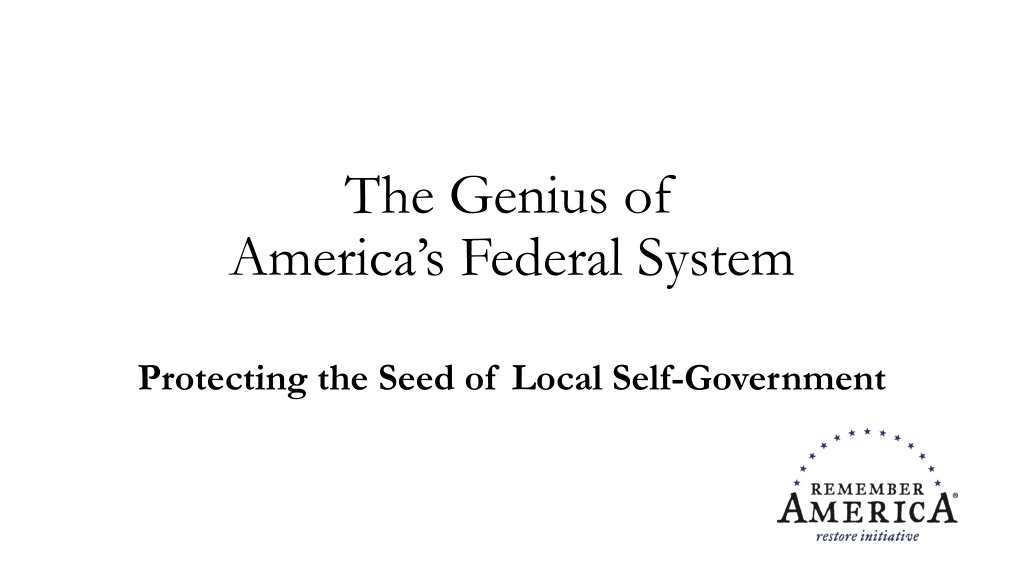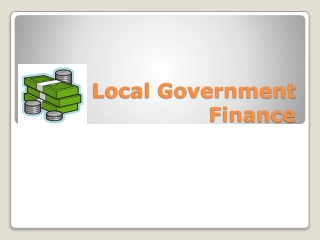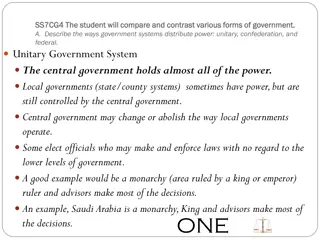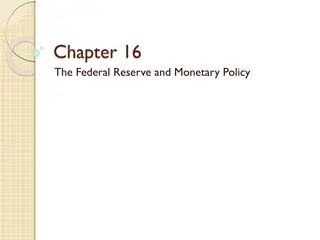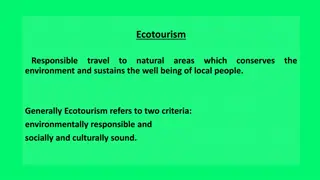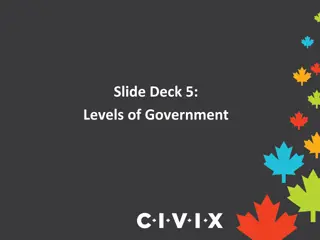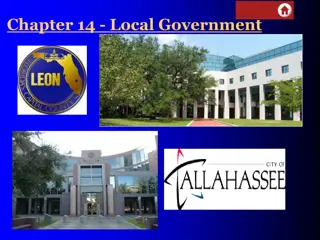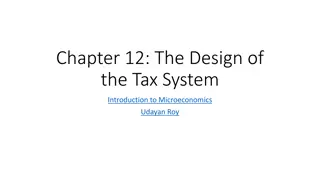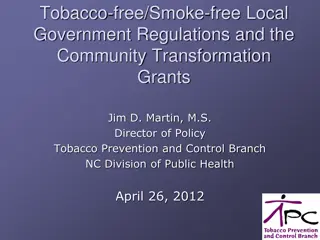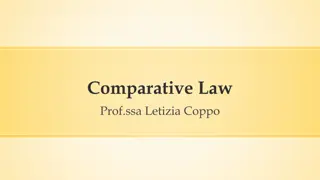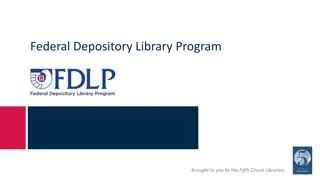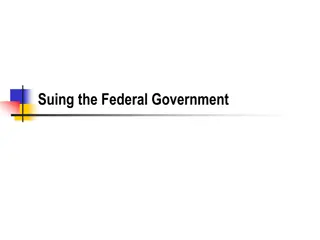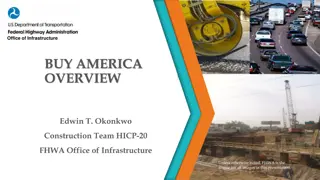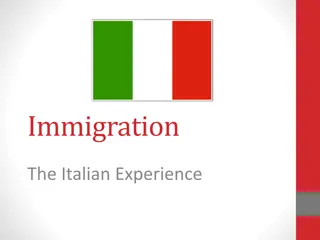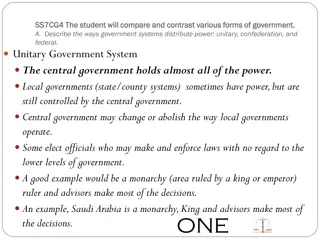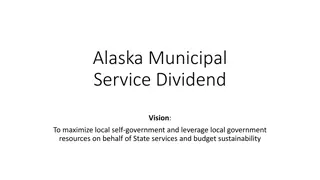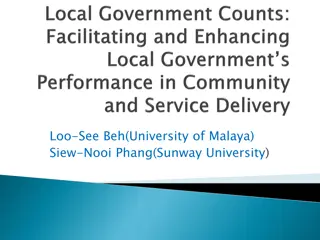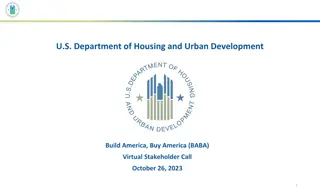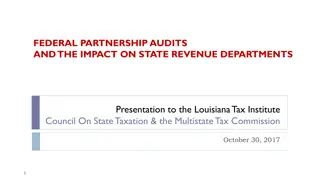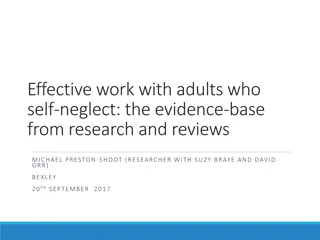America's Federal System: Protecting Local Self-Government
The genius of America's federal system lies in safeguarding the seed of local self-government, intertwining liberty, law, and Christianity to form the backbone of the nation. From the Christian roots of self-government to the principles of consent and limited powers in the Constitution, the journey of American governance unfolds through the lens of history and ideology.
Download Presentation

Please find below an Image/Link to download the presentation.
The content on the website is provided AS IS for your information and personal use only. It may not be sold, licensed, or shared on other websites without obtaining consent from the author. Download presentation by click this link. If you encounter any issues during the download, it is possible that the publisher has removed the file from their server.
E N D
Presentation Transcript
The Genius of America s Federal System Protecting the Seed of Local Self-Government
Maximum Liberty for the Individual Law without Liberty = Slavery (external force based on someone else s desires) Liberty without Law = Anarchy (internal force based on the desires of each person s own self) Liberty with Law = Christianity, the basis for America s republican form of government
Today, when thinking and talking in terms of civil government, our ignorance of fundamental Christian history in the founding of our country becomes at once apparent. We invariably reject or misconstrue references to the word Christian in relation to civil governments as being doctrinal and sectarian. Our Christian history as a nation does not involve doctrinal or sectarian views, and our failure to understand this, largely contributes to the present disregard of Christianity in relation to civil government. Each religion has a form of government, and Christianity astonished the world by establishing Self-Government. With the landing of the Pilgrims in 1620, Christian Self-Government became the foundation stone of the United States of America. Hall, V. M. (2006). CHOC I, p.iii
Our Christian Form of Government Genesis: Pre-fallen man is a Christian model of home government established by God where Adam and Eve enjoyed the fullest expression of liberty yet had the responsibility to voluntarily consent to walk with God, work His plan, and worship Him (Self-Government under God). Each religion has a form of government Christianity produced a form of government called Christian self- government which astonished the world. Internal Christian self-government produces external Christian civil government. 4
The Principles of our Constitution Consent of the Governed The people made the Constitution, and the people can unmake it. It is the creature of their will, and lives only by their will. Chief Justice John Marshall, Cohens v. Virginia, (1821)
The Principles of our Constitution Limited and Enumerated Powers [T]he powers of the federal government are enumerated; it can only operate in certain cases; it has legislative powers on defined and limited objects. James Madison, Speech in the Virginia Ratifying Convention, June 6, 1788 The powers not delegated to the United States by the Constitution, nor prohibited by it to the States, are reserved to the States respectively, or to the people. 10th Amendment
Federal, a. (Webster, 1828) 1. Pertaining to a league or contract; derived from an agreement or covenant between parties, particularly between nations. 2. Consisting in a compact between parties, particularly and chiefly between states or nations; founded on alliance by contract or mutual agreement; as a federal government, such as that of the United States. 3. Friendly to the constitution of the United States. [See the Noun.] Federal, n. - An appellation in America, given to the friends of the constitution of the United States, at its formation and adoption, and to the political party which favored the administration of President Washington.
Flow of Power in a Federal Constitutional Republic National States The People Any other powers not enumerated in the US Constitution and the respective State Constitution, based in the inalienable rights given by the Creator The powers enumerated in the US Constitution Any powers not enumerated in the US Constitution and those that are enumerated in the respective State Constitutions
Another way of looking at it: God People Civil Government (Federal) National States Local (closest to the people)
Our Christian Form of Government The Godhead of the Trinity demonstrates the separate branches of government. Isaiah 33:22 God Father Lawgiver Son Judge Holy Spirit - carries out the plan Government Legislative Judicial Executive 10
Our Christian Form of Government The External Form Principle of Representation Deut. 1:9-18 Principle of Separation of Powers Isaiah 33:22 Dual form of our Government Matthew 22: 37-40 11
Dual Form of Government God Our Christian Form of Government What is the dual form of our government and what is its Biblical basis? Law of Love Matt. 22:37-39 Man Man 12
The Structure of our Constitution The Preamble Articles 1-7 Amendments 1-10 Amendments 11-27
The Structure of the US Constitution The Preamble We the People of the United States, in Order to form a more perfect Union, establish Justice, insure domestic Tranquility, provide for the common defense, promote the general Welfare, and secure the Blessings of Liberty to ourselves and our Posterity, do ordain and establish this Constitution for the United States of America. Note: A preamble in a legal document is not a source of important rules or a grant of power. Thus the preamble of the Constitution contains no grant of power either.
The Structure of our Constitution Articles 1-7 Article 1: The Legislative Branch Article 2: The Executive Branch Article 3: The Judicial Branch Article 4: Administrative Details Article 5: Amending the Constitution Article 6: Debts, Supremacy and Oaths Article 7: Ratification of the Constitution
The 9th Amendment The enumeration in the Constitution, of certain rights, shall not be construed to deny or disparage others retained by the people. Other rights? Which ones? Who decides? How are they to be protected? 3:00
The 10thAmendment The biblically grounded Constitution spells out the limits of the national government. What is not expressly given to it, defaults to the states (based on their individual constitutions) and to the people from whose consent government has its authority under God.
What About the States? All but two of the original state constitutions pre-date the U.S. Constitution. Some of the early colonial Constitutions greatly informed the U.S. Constitution. In early May of 1776, the Continental Congress sent a circular letter to the 13 colonies encouraging all who had not yet done so to enact new government. This was an act of independence, two months prior to July 4th. So, the Colonies acted as independent sovereign states to separate from England.
What about the States? When the US Constitution was ratified in 1788, it immediately established a superior relationship over all state law, including state constitutions (see Article 6, the Supremacy Clause). There is no direct connection between the state constitutions and the national one other than the Supremacy Clause and by inference in Article 1 Section 9 (which binds the states in certain ways) and some of the Amendments (which place additional limitations on the states).
What about the States? The US Constitution acknowledges the states but makes no direct mention of their constitutions. Neither the state constitutions nor the national constitution legitimate each other. They setup and operate distinct sovereign entities. It was the state governments which sent delegates to the Constitutional Convention of 1787, but "The People" which ratified the Constitution, not the state governments. This is significant in that the authority of the new government was based on the consent of those governed.
What about the States? By 1787, eleven of the thirteen states had enacted new constitutions. More than half of the constitutions contained declarations of rights. All state governments were republican in form (liberty with law; elected representatives based on the citizens vote). Many of the men who participated in the drafting of the state constitutions participated in the Grand Convention.
The Damaging of our Constitution Supreme Court Malfeasance: U.S. v Butler (1936). The Court declared the General Welfare Clause a separate grant of power, not a caption to the enumerated powers as Madison insisted in 1792. Helvering v. Davis (1937). Congress may define general welfare any way they wish. Wickard v. Filburn (1942). Nearly anything can be shown to have some effect on interstate commerce and can thus be regulated by Congress.
The Damaging of our Constitution Congressional Maladministration Congress has proceeded as though there were no limits to the legislation it may enact. Although not a Constitutional violation, Congress has placed our economy in danger by growing the debt to $28+ Trillion. "If the debt should once more be swelled to a formidable size, its entire discharge will be despaired of, and we shall be committed to the English career of debt, corruption and rottenness, closing with revolution. Thomas Jefferson, to Albert Gallatin, 11 October 1809
Healing the Constitutional Breech The Role of the Supreme Court It can fix much of the damage it has caused but not unilaterally It requires both a majority of originalist justices, and the right cases to be presented. 3:15
Healing the Constitutional Breech The Role of Congress It can repair much of the damage it has caused by taking an originalist view of its true and voluntarily limited constitutional powers. This requires men and women of conviction and moral character for the good of the nation and people. 3:15
Healing the Constitutional Breech The Role of the People They can repair much of the damage they have allowed by electing men and women who are originalists, conservative, and have high moral and ethical standards beginning with their local government position and outward office holders (public servants). 3:15
The Future of our Constitution The Role of the Amendment Process Article V describes two methods of amending (hopefully, repairing) the Constitution: either Congress or an Article V convention can draft amendments and send them to the states for ratification. Will Congress ever propose amendments which reduce their power or impose term limits?
Emphatic Conclusion Our Constitution is unique, others have copied it, but we were the first with a Constitution formed by We the People. But it was made only for a religious and moral people.* Our Constitution has roots in the Hebrew Republic and British law going back to Magna Carta. Knowing its full history and provenance helps us better understand it. The Constitution is built upon timeless republican principles. *John Adams, To the Officers of the First Brigade of the Third Division of the Militia of Massachusetts, October 11, 1798.
Emphatic Conclusion (cont.) Errant Supreme Court rulings and Congressional mischief have damaged the original understanding of the Constitution. The structure of the Constitution is not difficult to understand, yet the American people have demonstrated an appalling ignorance of and apathy towards the Constitution. The Constitution s original meaning can be restored, but it will take time and effort; you can help!
Remember These Words O Posterity! You will never know how much it cost the present Generation to preserve your Freedom! I hope you will make good use of it. If you do not, I shall repent in Heaven, that I ever took half the Pains to preserve it. John Adams, letter to Abigail Adams, 26 April, 1777 118
Justification to resist governmental authority? Romans 13: Governments are responsible (ordained by God) to commend the good and punish the evil doer (Also, I Peter 2) When the government begins doing the opposite it is no longer God s servant for good. What is the current governmental report card as a minister of God for to you for good?
Justification to resist a governmental authority? The Revolution was effected before the war commenced. The Revolution was in the minds and hearts of the people; a change in their religious sentiments of their duties and obligations. While the king, and all in authority under him, were believed to govern in justice and mercy, according to the laws and constitution derived to them from the God of nature and transmitted to them by their ancestors, [the colonists] thought themselves bound to pray for the king and queen and all the royal family, and all in authority under them, as ministers ordained of God for their good; but when they saw those powers renouncing all the principles of authority, and bent upon the destruction of all the securities of their lives, liberties, and properties, they thought it their duty to pray [instead] for the continental congress and all the thirteen State congresses, &c. John Adams, Letter to Hezekiah Niles, 13 February 1818. 3:25
What about a Theocracy? I am a democrat because I believe that no man or group of men is good enough to be trusted with uncontrolled power over others. And the higher the pretensions of such power, the more dangerous I think it both to the rulers and to the subjects. Hence Theocracy is the worst of all governments. I few must have a tyrant a robber baron is far better than an inquisitor. The baron s cruelty may sometimes sleep, his cupidity at some point be sated; and since he dimly knows he is doing wrong he may possibly repent. But the inquisitor who mistakes his own cruelty and lust of power and fear for the voice of Heaven will torment us infinitely because he torments us with the approval of his own conscience and his better impulses appear to him as temptations. And since Theocracy is the worst, the nearer any government approaches to Theocracy the worse it will be. C.S. Lewis
